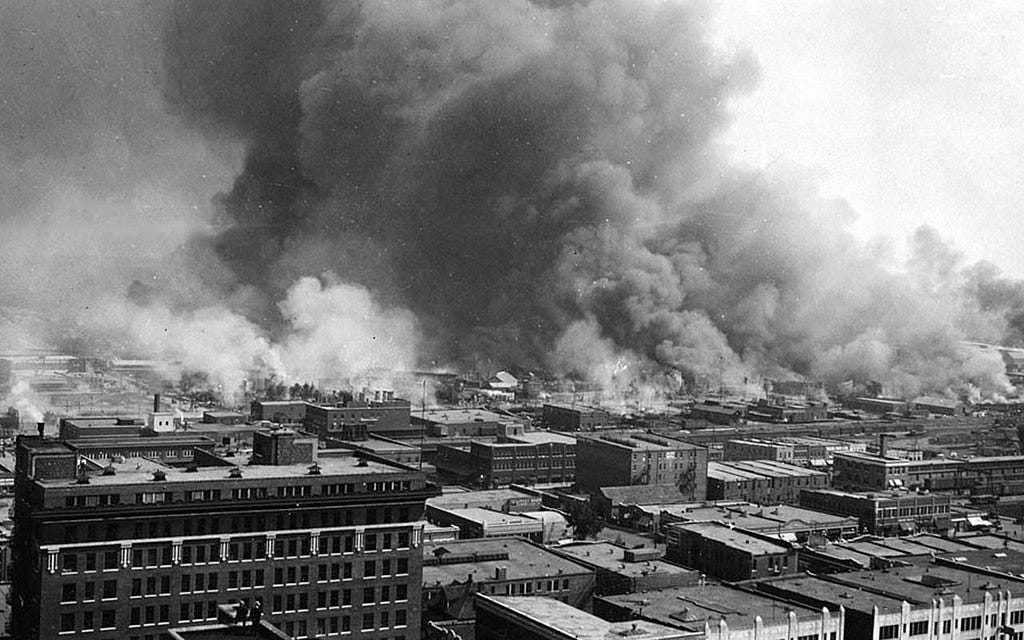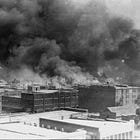Tom Hanks Mad He Didn't Learn About The Tulsa Massacre In School, And He's Right
We all need our history. All of our history.

The Internet can mess with your sense of time, as we all occasionally realize when we glance up from reading just one more link to discover we can’t perceive three dimensional space right anymore. For instance, we weren’t terribly surprised when we learned that a viral video pinging around Twitter this week — in which Tom Hanks discusses how he only learned about the Tulsa Race Massacre a few years ago — is originally from a July 2022 podcast.
But hey, we hadn’t seen it, so it’s new to us, and it’s sparked some good conversations — on Twitter in 2024 no less! — about history, race, and education, and inevitably the Current Political Atmosphere surrounding all three. So in case you haven’t seen it, or even if you have, let’s watch together.
Hanks recalls reading a New York Times article about a 100-year-old survivor of the Tulsa Massacre and wondering “What’s the Tulsa Massacre?” And then he wondered how he hadn’t learned about the destruction of “Black Wall Street” in school.
At the age of 10 when I was in fifth grade, living in Oakland, California, that would have been a moment of enlightenment for me that would have told me something very very different about the city I lived in. […]
And it made me mad. It made me mad that somebody had somehow made an editorial process of what was appropriate for us to learn about our own American history. […] It's not right, and it's doing a disservice to all of America.
As I say, the video sparked some pretty thoughtful replies, at least once you got away from the Elon bros replying to the original post. There were multiple posts from people who’d gone to school in Oklahoma and never been taught about the massacre, as well as some compelling observations about why we need accurate history in schools, like this:
More of this, please. Hanks is exposed to a horrific event in US history, and instead of being angry that he is exposed to something upsetting, he's outraged at the people who kept this in the dark for so long. Serious adults want to understand the world in which they live.
And in the replies to that one, this:
I recall teaching the massacre in Oregon to a student who just graduated from an Oklahoma HS and his mind was blown that he had never even heard of it... it led him down some dark paths of what else had been withheld from him in his education... #historymatters
I have had an ongoing similar reaction to my “education” in Florida public schools. Next to no coverage of anything re: people of color (Reconstruction, lynchings, etc.), but we did have a mandatory course called “Americanism vs. Communism.”
And one more reply (it was a good thread!):
I grew up in Oklahoma and didn't learn and this massacre until I was in college in a completely different state.
Oklahoma public schools sure did like to tell us about the Land Rush though.
And of course now I can’t find a separate comment that sort of hit home for me, which noted that Hanks’s reaction was somewhat similar to that of kids whose education focused only on the heroic narratives of America history, who then get to college and find out there were a lot of gaps in that version of history.
Clearly, the solution is to prohibit negative stuff from being taught at the college level.
There were also some very accurate observations like this one, pointing out that the whitewashing of history is of a piece with white supremacy:
Tom Hanks wanna know why he hadn’t learned about the Tulsa Massacre aka Black Wall Street being burned down by white racists until recently & this is an example of what I know: White ppl do not know an accurate account of White history in America but try to argue with us about it
Now, as I say, it turns out the video clip is from June 2022, just resurfacing this week the way the internet does, and so I wasn’t too surprised to learn myself that I’d missed the 2021 New York Times op-ed Hanks wrote (gift link) for the centennial of the massacre, in which Hanks noted that selective teaching of history is inevitable when white people’s sensitivities get more attention than any commitment to teaching the whole truth:
The truth about Tulsa, and the repeated violence by some white Americans against Black Americans, was systematically ignored, perhaps because it was regarded as too honest, too painful a lesson for our young white ears. So, our predominantly white schools didn’t teach it, our mass appeal works of historical fiction didn’t enlighten us, and my chosen industry didn’t take on the subject in films and shows until recently. It seems white educators and school administrators (if they even knew of the Tulsa massacre, for some surely did not) omitted the volatile subject for the sake of the status quo, placing white feelings over Black experience — literally Black lives in this case.
Writing in the context of that year’s freshly manufactured freakouts over “critical race theory,” Hanks concluded with a call to oppose “the battle to whitewash curriculums to avoid discomfort for students.”
Now, here I go being a Doktor of Rhetoric. Just look at how this closing paragraph is constructed, alternating between historical high points of mostly-white-focused American history (all of which, coincidentally, have been the topic of Tom Hanks movies) and our simultaneous failings on race (movies he may make/produce yet?). It’s as if Hanks is asking, If we can do these great things then why is America so fucked all the time?
America’s history is messy but knowing that makes us a wiser and stronger people. 1921 is the truth, a portal to our shared, paradoxical history. An American Black Wall Street was not allowed to exist, was burned to ashes; more than 20 years later, World War II was won despite institutionalized racial segregation; more than 20 years after that, the Apollo missions put 12 men on the moon while others were struggling to vote, and the publishing of the Pentagon Papers showed the extent of our elected officials’ willingness to systemically lie to us. Each of these lessons chronicles our quest to live up to the promise of our land, to tell truths that, in America, are meant to be held as self-evident.
It's all one story, and we need to tell it all, both in history classes and in entertainment.
So thank you, internet, for resurrecting a 2022 video about a 2021 op-ed about a 1921 atrocity. Especially as we go into this 2024 election between an old white guy who has made plenty of his own gaffes on race but is committed to doing better, and an old white guy who relishes stirring up hatred and would gladly urge on very fine white people with torches who want to burn it all down.
I know which America I want to live in.
[NYT (gift link)]
Yr Wonkette is funded entirely by reader donations. If you can, please subscribe, or if a one-time donation works better for you, here’s your button:





Earned 5s on both US and European history AP exams
Daughters of the American Revolution scholarship recipient
BA in History
MAT
Taught US history at the secondary level for years
Tulsa Massacre? Nope. Didn’t know a thing about it until Watchmen, despite being very revisionist and literally using Lies My Teacher Told Me as a sacred source.
No bueno.
I didn't learn about the Tulsa Race Massacre until HBO's "Watchmen" used it as part of the backstory of their take on Hooded Justice. Just the same, I didn't learn about the Tuskegee Syphilis Study from history books, but while doing research on the Marvel limited series "Truth: Red, White, and Black", which introduced Isaiah Bradley aka The Black Captain America to Marvel continuity - and used the Tuskegee Syphilis Study for reference. Nor did I learn about the tale of Henrietta Lacks from history books, but from YouTube videos dissecting the inclusion and portrayal of Isaiah Bradley in "The Falcon and the Winter Soldier". And I definitely didn't know the Harlem Cultural Festival even existed until the documentary "Summer of Soul" by Questlove hit the streets in 2022.
So yeah, pop culture doing a lot of heavy lifting for buried history.